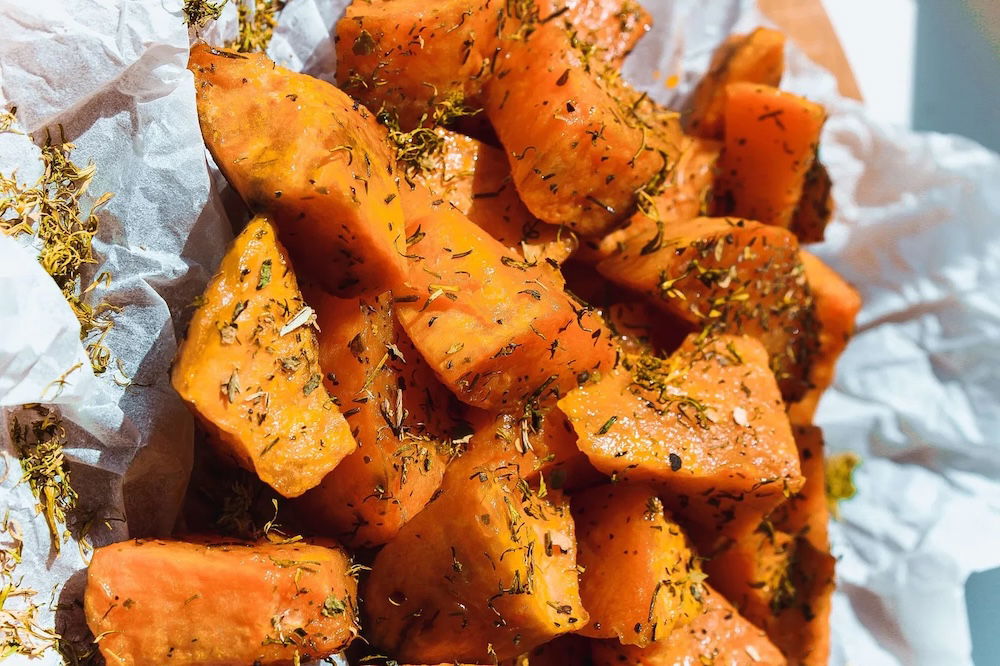Are you often stressed or suffering from burnout symptoms? Then looking at what you eat is a good first step. After all, nutrition has a direct impact on the health of your gut and your well-being in general. Find out in this article what is the best diet for stress and burnout symptoms.
9 foods that help with stress and burnout

What should you eat if you have burnout?
A healthy diet gives you the nutrients you need and ensures that you have enough energy to deal with stressful situations. This is hugely important if you suffer from stress or burnout symptoms.
The tricky thing is that there is no one-size-fits-all approach when it comes to a healthy diet. Every body is different - and different bodies need different things. Still, it is important for everyone to eat as varied a diet as possible and get enough fiber and protein.
Do you suffer from stress? Make sure you eat as many different fruits and vegetables as possible and get 1.5 to 2 grams of protein per kilogram of body weight. It is best to split the protein between animal and plant products (such as dairy, beans, legumes, meat and fish).
What foods lower stress?
While no food or drink can beat the effect of a healthy and varied diet, there are a number of foods with stress-relieving properties. It is important to see these foods not as a quick fix for stress, but as an addition to a healthy diet.
1. Sweet potato
Sweet potatoes are rich in complex carbohydrates that promote the production of serotonin. Serotonin is a neurotransmitter that positively affects our mood and helps regulate stress. In addition, sweet potatoes contain vitamin C, which can help lower blood pressure and reduce the production of stress hormones.
2. Shellfish
Shellfish (such as mussels, oysters and clams) are full of omega-3 fatty acids. These fatty acids have anti-inflammatory properties and can relieve stress. Oysters are also full of zinc and iron. Research has linked zinc deficiency to anxiety. In fact, low iron levels can cause feelings of anxiety and depression.
3. Oily fish
Oily fish (such as salmon, mackerel and sardines) are also rich in omega-3 fatty acids. These fatty acids have anti-inflammatory properties and can help reduce stress and anxiety. They also promote the production of serotonin, which provides a calming effect.
4. Sunflower seeds
Sunflower seeds are full of magnesium! Magnesium plays an important role in regulating the body's response to stress. It helps relax muscles, promotes a sense of calm and can reduce anxiety. For example, you can add sunflower seeds to a salad or bowl of yogurt.
5. Chickpeas
Chickpeas are rich in tryptophan. This is an amino acid needed for the production of serotonin. In addition, chickpeas are also a good source of fiber and complex carbohydrates (complex carbohydrates release energy slowly and help stabilize blood sugar levels). This can help reduce mood swings.
6. Chamomile tea
Chamomile tea is known for its calming properties. It contains antioxidants that are anti-inflammatory and help reduce stress and anxiety. Chamomile tea can also make you feel relaxed and promotes sleep. Do you sleep poorly? Make drinking a cup of chamomile tea part of your evening routine.
7. Organ meats
Organ meats (for example, liver) are not everyone's thing. But if you do eat meat, organ meat is one of the best sources of vitamin D, B and zinc. Vitamin B plays an important role in supporting the nervous system and regulating your mood.
8. Dark chocolate
If you are a chocolate lover, we have good news for you. Dark chocolate with a high cocoa content (more than 70% cocoa) contains flavonoids and antioxidants that can help reduce stress. Chocolate also stimulates the production of endorphins. These are neurotransmitters that have the property of suppressing stress and giving way to a feeling of happiness.
One study showed that people who drank one chocolate drink a day (which was equivalent to about 45 grams of dark chocolate) felt calmer and calmer than those who did not.
9. Dark leafy vegetables
Dark leafy vegetables (such as spinach, kale and chard) are all rich in magnesium. There is also a lot of vitamin B, folate and fiber in leafy vegetables, all of which have a positive impact on your mood and well-being in general.

- Sweet potato
- Shellfish
- Oily fish
- Sunflower seeds
- Chickpeas
- Chamomile tea
- Organ meats
- Dark chocolate
- Dark leafy vegetables

Chamomile tea is known for its calming properties. It contains antioxidants that are anti-inflammatory and help reduce stress and anxiety. Chamomile tea can also make you feel relaxed, which can lead to a good night's sleep.
Written by:


















